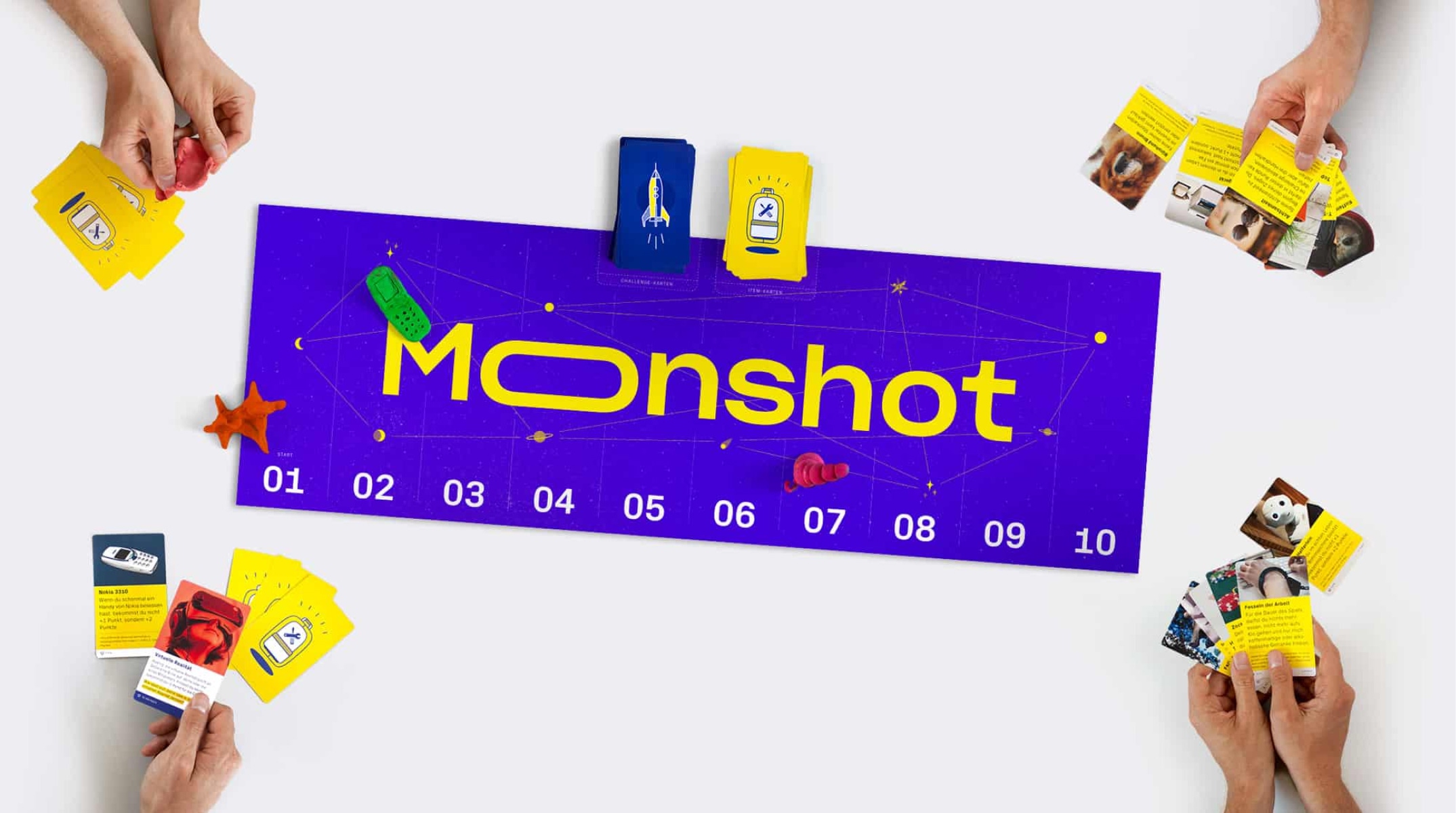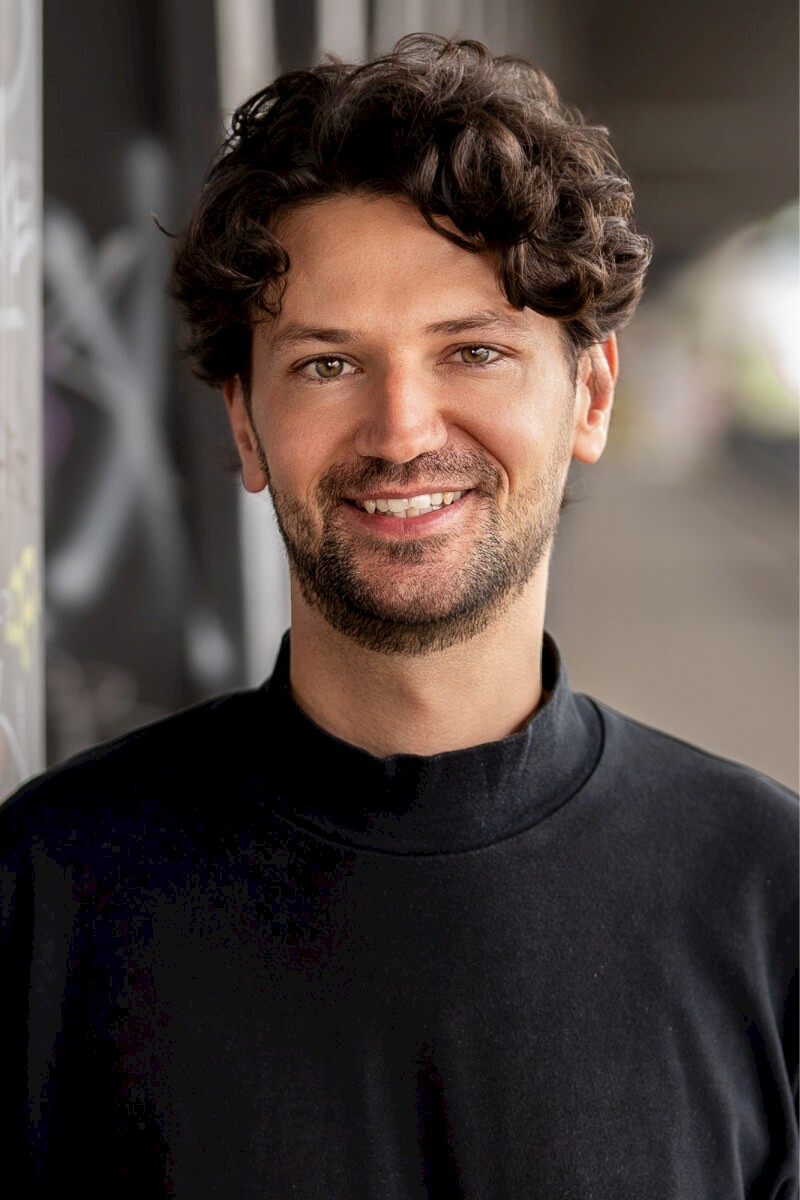Moonshot - The innovation game
Innovation cannot be planned. It takes more than linear methods to be able to deal with the world's ever faster cycles of change. Take your project to the next level with our moonshot game.
Innovation cannot be planned. It takes more than linear methods to be able to deal with the world's ever faster cycles of change. Take your project to the next level with our moonshot game.

Even if many innovation methods pretend to be: There is no instruction manual for bringing something new into the world. Approaches that promise to produce innovative products or services in X number of steps can only fail. Innovation is not a ready-made kit that can be put together with the help of an instruction manual. Change is not linear. It is more complicated.
We believe that much of what it takes to be creative already exists in companies. There are already more than enough consultants who explain the world to employees. There is no lack of expertise. Discipline, another often underestimated component for the success of creative processes, is also available in abundance and is certainly not the reason why companies in Germany often find it difficult to create something new.
What is missing is a creative buzz that mixes up existing knowledge and believed truths and reassembles them - not just once, but every day. Because if you want to create something new in turbulent times, you have to be prepared to constantly and productively irritate yourself and the people around you.
Today more than ever, we must be ready at all times to allow encounters with the new and transfer them into our contexts. It's about linking things together that supposedly have nothing to do with each other. This is how something new is often created: by combining knowledge from different areas.
It takes courage to simply get started. At the same time, however, there is tremendous potential in getting started without having finalised the idea down to the last detail. While we discuss or mould the unfinished, we reflect on it from a new perspective while doing it ourselves.
It takes even more courage than getting started to discard what has already been started. Only when we have tried something out can we see whether it resonates - with us and with others. Anyone who experiments must be able to tolerate failure and learn to appreciate the process.
Those who always think and act in predetermined ways are so tunnelled that they simply overlook random, happy events. Luck cannot be managed. This makes it all the more important to be able to recognise a lucky situation and make effective use of it.
This may sound trivial, but it doesn't work without fun. After all, the most productive moments are often those when it doesn't feel like you're being productive at all. In order to be able to think in radically new ways, you need an atmosphere in which you can act outside of fixed routines and contractual obligations.
One thing is clear: if you want to remain capable of acting in uncertain environments, you have to become a player. Complex games are able to generate this kind of creative noise. They create their own reality and open up a space for experimentation in which participants can try things out without having to fear negative consequences. They are exhausting, irritating and complex. And yet the social mechanisms are comparable to those that can be observed in everyday working life. In this respect, games are just as suitable for reflecting on past behaviour as they are for anticipating and training future actions.
In uncertain times, it is therefore less and less about solving problems, because for that we would first have to know the problems - much more important is the ability to play. Bruce Nussbaum, Professor of Innovation and Design at Parsons New School of Design, summarises this in his book Creative Intelligence (2013): The language of entrepreneurs is the language of play. They're not out there solving problems; they're out there playing - and it's during this process that they're coming up with disruptive technologies and life-changing products.
In Moonshot, players compete against each other with their ideas and constantly transform them using different creativity techniques. This requires associative thinking,
a high level of revision skills and the willingness to constantly adapt to changing conditions.
What would a universe look like in which your product could be found in absolutely every household? What would be the most pointless thing you could do with your idea? And how can your idea utilise characteristics of nature? Moonshot asks players to pitch an answer to these challenges in 30 to 60 seconds and then have themselves assessed by their fellow players. There is hardly any time to think, and that is intentional. In his essay "Über die allmähliche Verfertigung der Gedanken beim Reden" (1805), Heinrich von Kleist already pointed out that there is a special power in the simultaneity of thinking and talking.
And so in Moonshot, even the shyest idea providers can become pitch professionals, the nicest colleagues can become persistent sparring partners, and ideas that were previously unthinkable can be negotiated at the game table. Moonshot creates an arena in which players compete and unconsciously train their adaptive mindset. In this flow of silly seriousness, out-of-the-box thinking suddenly becomes easy. After all, you don't really think "out", but constantly "in" new boxes. Creative productivity does not arise under pressure and rarely alone. It is created together at the table.
But how do you use the Moonshot game as a tool? How can you test existing business models in Moonshot and identify new docking points? And how do the ideas actually get out of the game?
With nextMedia.Hamburg, we have developed our own media edition of Moonshot. In a multi-stage workshop with media experts, we identified current challenges in the media industry and transferred them to the Moonshot framework. This resulted in challenges such as "Present a concept for how you can continue to operate your idea without having to use GAFA's services and products." Or: "Think of an unconventional merchandise product for your idea that would work well on Instagram."
The aim of the collaboration was to create a version of Moonshot that reflects the competences and specific challenges of the media industry and enables people to train a creative approach to them. The resulting game is suitable for critically scrutinising existing business models of media start-ups, testing alternatives and developing new ideas. For nextMedia.Hamburg, the game is a useful tool for expanding Hamburg's leading position as a media and digital location.
Are you interested in a customised version of the Moonshot innovation game that suits your company or industry? Then please send an email to
Would you like to play Moonshot for the media and digital scene with us? Then get in touch with our programme manager Bruno.
Bruno Marks
Phone: +49 40 / 23 72 435 67
Mail:
